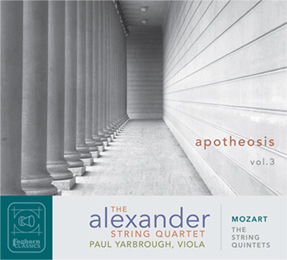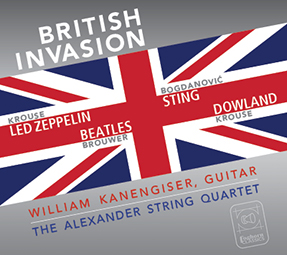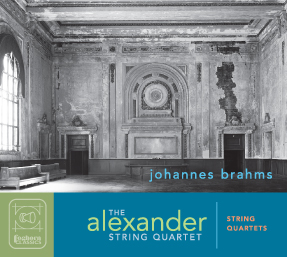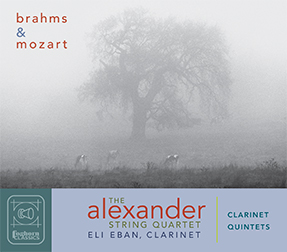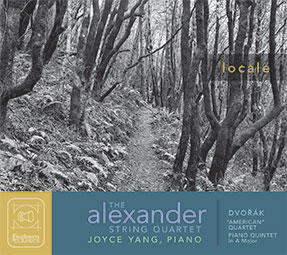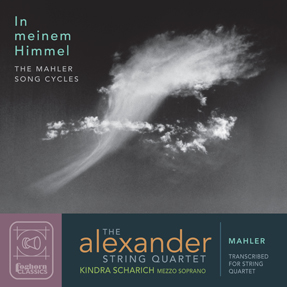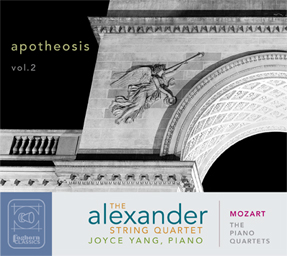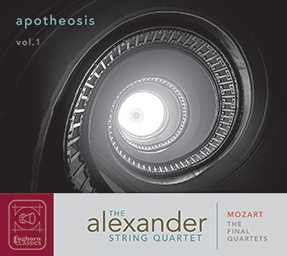new releases
Available Now:
Mozart: Apotheosis 1, 2, 3
We are pleased to complete our late-Mozart compendium with the release of Apotheosis vol. 3 (FCL2024) featuring violists David Samuel and Paul Yarbrough:
Apotheosis vol. 1 — Mozart Final Quartets (FCL2016)
Apotheosis vol. 2 — Mozart Piano Quartets, with Joyce Yang (FCL2018)
Apotheosis vol. 3 — Mozart String Quintets, with Paul Yarbrough (FCL2024)
From the liner notes by Eric Bromberger:
We think of Mozart as a pianist, but he was also a violinist, and a very good one. After playing a series of concerts in 1777, the 21-year-old exulted: “I played as though I were the greatest fiddler in all of Europe.” Yet the role of violinist appears to have had limited appeal for Mozart, and when he played chamber music, he invariably chose to play the viola. There are many accounts, especially during his years in Vienna, of Mozart’s playing the viola in chamber performances. These range from the famous “quartet evening” in 1784 (when Dittersdorf and Haydn were the violinists and Vanhal the cellist) to the premiere of his Clarinet Quintet in December 1789. Why was Mozart drawn to the mid-range role of the viola rather than the more extroverted role of violinist? Perhaps he liked being in the “middle” of the music, where harmonies shift and unexpected rhythms underpin the more exposed melodic lines. Perhaps he simply liked the husky sound of the viola. Whatever the reason, Mozart felt a particular fondness for the viola, a fondness that showed up in some very particular ways in his chamber music. Read more
Recent release:
British Invasion
The Alexander String Quartet and guitarist William Kanengiser form a dynamic collaboration that explores the music of Sting, Led Zeppelin, John Dowland and The Beatles by way of contemporary composers Ian Krouse, Dušan Bogdanović and Léo Brouwer. In this project, Kanengiser and the ASQ pay tribute to a group of English musicians who conquered the musical world with their revolutionary explorations. From Elizabethan lutenist John Dowland to pop/rock icons Sting, The Beatles and Led Zeppelin, these artists made a lasting impact far from the shores of their small island. Their music inspired this set of original compositions for guitar and string quartet by talented composers Ian Krouse, Dušan Bogdanović and Léo Brouwer. It is especially appropriate that the guitar sits squarely at the center of these works, as the plucked string was the primary musical voice of these British innovators.
Read more…
Gramophone Video of the Day — from "British Invasion"
______
Brahms, Brahms and Brahms:
BRAHMS STRING QUARTETS (and Intermezzo)
The Alexander String Quartet is pleased to announce the release of Brahms' string quartets, plus the newly re-recorded Intermezzo in A Major, Op. 118 No. 2 (transcribed for string quartet by Zakarias Grafilo), all illuminated by Eric Bromberger's liner notes.
With this release, ASQ has completed a labor of love: FCL2022 joins these previous Foghorn releases to form a complete set of Brahms' works for strings: Brahms' String Quintets and Sextets (FCL2012) with Toby Appel and David Requiro; Brahms & Schumann Piano Quintets (FCL2014) with Joyce Yang, and Brahms & Mozart Clarinet Quintets (FCL2021) with Eli Eban (additional comments below).
For more on the journey toward this "Brahms compendium," visit In the Works.
___________________________________
BRAHMS & MOZART: CLARINET QUINTETS
(FCL 2021)
ALEXANDER STRING QUARTET
WITH ELI EBAN, CLARINET
Electrifying clarinetist Eli Eban and the Alexander String Quartet celebrate the two masterpieces widely considered the preeminent works in their form: the clarinet quintets by Mozart and Brahms. Eric Bromberger's liner notes place these works in context. Liner notes and reviews
___________________________________
DVOŘÁK: LOCALE (FCL 2020)
ALEXANDER STRING QUARTET
WITH PIANIST JOYCE YANG
With Locale, the Alexander String Quartet presents brand new accounts of two of Antonín Dvořák’s most enduringly popular chamber works. The “American” String Quartet in F Major, Op. 96 from 1893 was written during the composer’s extended retreat from New York City to the rural “Czech” community of Spillville, on the Turkey River in northeastern Iowa. The ASQ plumbs the rich and reflective “outdoor” nuances of this exquisitely crafted masterpiece. And the miraculous pianist Joyce Yang joins the Alexanders once again for this recording of the jubilant Piano Quintet in A Major, Op. 81 from 1887, composed at Dvořák’s country home amidst Bohemia’s woods and fields in Vysoka, just a little south of Prague. These two works are among the composer’s most expressively articulate chamber works. Both are profoundly influenced by their geographic “locale” and are, perhaps, exemplars of the sophisticated duality of the transatlantic experience of the late 19th century, embracing the nostalgia of the traditional bucolic ideal and the urbane sophistication of the imminent new age. Eric Bromberger’s accompanying notes and commentary provide illuminating musical and historical context, not least some of Dvořák’s own thoughts on the American-ness of his quartet. Read more
___________________________________
WORLD PREMIERE RECORDING
(transcriptions by Zakarias Grafilo,
commissioned by LIEDER ALIVE!)
IN MEINEM HIMMEL — THE MAHLER SONG CYCLES
ALEXANDER STRING QUARTET
KINDRA SCHARICH, mezzo-soprano
FCL 2019
Three of Mahler’s beloved song cycles have been transcribed for string quartet and mezzo-soprano by ASQ violinist Zakarias Grafilo: Lieder eines fahrenden Gesellen (Songs of a Wayfarer); Rückert-Lieder; Kindertotenlieder. Visit this page for notes on the transcription, liner notes by Eric Bromberger, and the complete list of songs:
“…transcriber violinist Zakarias Grafilo, gave much thought and effort to preserve some of the aural colours and even the emotional ‘innigkeit’ of the original… Idiomatic and virtuoso string playing and the singing is simply gorgeous. Young American mezzo Kindra Scharich has a beautiful voice, total emotional commitment and musical imagination that certainly makes worthwhile listening. Her soulful, anguished tone when the rejected lover sings about the two beautiful blue eyes of his lost sweetheart (Die zwei blauen Augen) is simply heartbreaking and I just loved her voice so full of joy in exclaiming Heia! in Ging heut morgen.”
— Janos Gardonyi, The Whole Note (Mar. 2019, FCL 2019 In meinem Himmel)
“[Grafilo's] aim is achieved perfectly in these beautiful recordings by the Alexander Quartet with the excellent American mezzo soprano Kindra Scharich.”
— New Classics, UK (FCL 2019 In meinem Himmel)
___________________________________
APOTHEOSIS, VOL. 2 (FCL 2018)
MOZART: THE PIANO QUARTETS:
ALEXANDER STRING QUARTET
WITH PIANIST JOYCE YANG
Members of the Alexander String Quartet join with electrifying and much-lauded pianist Joyce Yang on this recording of Mozart’s two piano quartets, Apotheosis, vol. 2, the second of a three-volume set. Eric Bromberger’s notes contextualize these works within the canon: “Some have claimed that Mozart invented the piano quartet, but he did not. Other composers — including the fourteen-year-old Beethoven — had written quartets for piano and strings earlier, but Mozart was the first to face squarely the challenges of this difficult form, and he wrote the first two great piano quartets.” Read more
APOTHEOSIS, VOL. 1 (FCL 2016)
MOZART: THE FINAL QUARTETS
ALEXANDER STRING QUARTET
This 2-CD set of Mozart’s final quartets is the first of three volumes which will include many of Mozart’s great chamber works from that period. Eric Bromberger's liner notes are prefaced by ASQ violist Paul Yarbrough's introduction (excerpted here): “[Mozart] had taken Haydn’s brilliant efforts with the string quartet and elevated and broadened the genre, while adhering to Haydn’s formal and conversational precedent. But however much Mozart’s late chamber works conform, they are never ‘conformist.’ They still have the capacity to be stunningly original, and even, especially for the listeners of the time, shocking.” Read more
